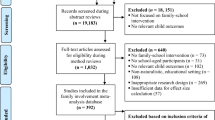Abstract
This article presents a qualitative evaluation of the first year of a mentor program for at-risk high school youth in a low income urban setting with high rates of youth and violent crime. Pre and posttest data were collected employing a standardized set of open-ended questions regarding the program and the mentees' relationships with their mentors. Overall there appears to be congruence between the mentees' expectations at pretest and posttest outcomes. Most were overwhelmingly positive about the program, developed a valued relationship with their mentors, and secured concrete benefits as well (e.g., employment and greater academic achievement). Two mentors who had a leadership role were also interviewed. Case studies of four of the adolescents are presented along with implications for practice.
Similar content being viewed by others
References
Carmola, I. J. (1995). The effects of mentoring on student growth.
Flaxman, E. (1992). Evaluating mentoring programs. New York Institute for Urban and Minority Education. New York: Columbia University.
Flaxman, E., &Ascher, C. (1992). Mentoring in action: The efforts of programs in New York City. New York Institute for Urban and Minority Education. New York: Columbia University.
Flaxman, E.,Ascher, C., &Harrington, C. (1989). Youth mentoring programs and practices. New York: ERIC Clearinghouse on Urban Education.
Ianni, F. A. J. (1992). Social, cultural and behavioral contexts of mentoring. New York Institute for Urban and Minority Education. New York: Columbia University.
JUMP. (1995). Juvenile mentoring program (JUMP). Guidelines Notice Federal Register 59 (p. 144) July 28, 1994, 38520–38522.
Rand Report. (1992). GE mentoring and other volunteer activities. Report prepared on GE College Bound Programs.
Smink, L. (1990). Mentoring programs for at-risk youth: A dropout prevention research report. Clemson, SC: National Dropout Center.
Struchen, W., &Porta, M. (1997). From role-modeling to mentoring for African American youth: Ingredients for successful relationships. Preventing School Failure, 41(13) (Spring), p. 119.
Rights and permissions
About this article
Cite this article
de Anda, D. A Qualitative Evaluation of a Mentor Program for At-Risk Youth: The Participants' Perspective. Child and Adolescent Social Work Journal 18, 97–117 (2001). https://doi.org/10.1023/A:1007646711937
Issue Date:
DOI: https://doi.org/10.1023/A:1007646711937




